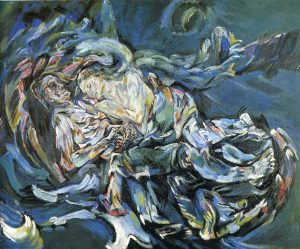Four Poems by Gabriele D’Annunzio
Translated from the Italian
by Michael Shindler (June 2022)

Bride of the Wind, Oskar Kokoschka, 1914
The deception
No, I don’t suffer. If my words lack their wings,
at dusk, when I have your feet for a pillow
(oh, the terror of the coming evening’s
torture up on that big white bed!), then know,
it is because my soul delights so greatly
within that oh-so very delicious peace
(all day and night a thought eats away at me,
at my very soul, without cease—without cease),
this peace that envelops me on every side
in a pleasure that is too—perhaps, uncouth.
(Do, Lord—do let your most humble servant hide
forever and ever the terrible truth!)
Oh, this great forswearing and oblivion
of all the world—upon your feet! Be blessed.
(My soul will never know oblivion,
never oblivion—never.) Be blessed.
L’inganno
No, non soffro. Se sono taciturno,
la sera, quando mi ti seggo ai piedi
(oh il terrore del prossimo notturno
supplizio in quel gran letto bianco!), credi,
è perché meglio l’anima assapora
questa tranquillità deliziosa
(giorno e notte un pensiero mi divora
l’ anima, senza posa, senza posa),
questa tranquillità che mi circonda
d’un gaudio troppo, forse, inconsueto.
(Fate, Signore, fate ch’io nasconda
per sempre il mio terribile segreto!)
Oh questa gran rinunzia e quest’oblìo
di tutto, ai piedi tuoi! Sii benedetta.
(L’anima non avrà giammai l’oblìo,
giammai l’oblìo, giammai.) Sii benedetta.
On Edvard Grieg’s “Erotik” [Op. 43, No. 5]
I want to very sorely love—slowly,
slowly—as death comes when it comes too late,
endlessly (I want it to dominate
over even death) and unchangingly.
I want without an end an agony
where in secret our souls can suffocate;
and for there to be a sea by our gate,
alone—that in silence weeps intently.
I want a tall tower of granite masonry,
so very tall that in the sky’s cool glow
it seems to touch just upon the North Star.
I want a bed of purple, and to find ajar
somewhere within your bosom’s shadow,
as deep within a tomb—infinity.
Sopra un “Erotik”
Voglio un amore doloroso, lento,
che lento sia come una lenta morte,
e senza fine (voglio che più forte
sia de la morte) e senza mutamento.
Voglio che senza tregua in un tormento
occulto sien le nostre anime assorte;
e un mare sia presso a le nostre porte,
solo, che pianga in un silenzio intento.
Voglio che sia la torre alta granito,
ed alta sia così che nel sereno
sembri attingere il grande astro polare.
Voglio un letto di porpora, e trovare
in quell’ombra giacendo su quel seno,
come in fondo a un sepolcro, l’infinito.
The good voice
You’re alone. On the one hand, you don’t feel it.
And yet, on the other hand—you never do!
Over your heart the flows of oblivion flit.
These humble paths are still sweet for you to stray.
There are still roses of the roses that grew.
There’ll be tomorrow what wasn’t yesterday.
Seize for yourself a new courage tomorrow
and even a new strength as well, timid soul.
At the first dewfall, at the first dawn-glow
doesn’t the grass rise beneath you as you stroll?
La buona voce
Sei solo. D’altro più non ti sovviene.
E d’altro più non ti sovvenga mai!
Sul tuo cuore fluisca l’oblìo lene.
Ti sien dolci questi umili sentieri.
Ancóra qualche rosa è ne’ rosai.
Sarà domani quel che non fu ieri.
Domani prenderà novo coraggio
e nova forza l’anima che teme.
A la prima rugiada, al primo raggio
non s’alza l’erba che il tuo piede preme?
Exhortation
Soul, why’re you so ignobly lingering
between boredom with life and fright
with death? The torches are smoldering.
In the lowlands there is no light.
Why’re you lingering? Are you still holding
out hope for some final heroic fight?
Take care with your way; unclothed, unspeaking,
as if constrained by two walls hidden from sight.
And seeing that no sudden thunderbolt flies,
why’re you, even now, lingering? Doubt not.
Great peace on you will be conferred.
More than once you’ve read in eyes
of corpses cold in their plot
that Death keeps his word.
Esortazione
Anima, a che t’indugi ignobilmente
fra il tedio de la vita e la paura
de la morte? Le faci sono spente.
Nulla riluce ne la bassura.
A che dunque t’indugi? Ancor ti mente
la speranza di un’ultima avventura?
Guarda ben la tua via; nuda, silente,
come constretta fra due cieche mura.
Poiché non giunge il fulmine improvviso,
a che t’indugi omai? Non dubitare.
La grande pace ti sarà concessa.
Più d’una volta tu leggesti in viso
ai cadaveri freddi ne le bare
che la Morte mantenne la promessa.
Michael Shindler is a writer living in Washington, DC. His work has appeared in publications including The American Conservative, The American Spectator, National Review Online, New English Review, University Bookman, and Providence. Follow him on Twitter @MichaelShindler.
Follow NER on Twitter @NERIconoclast